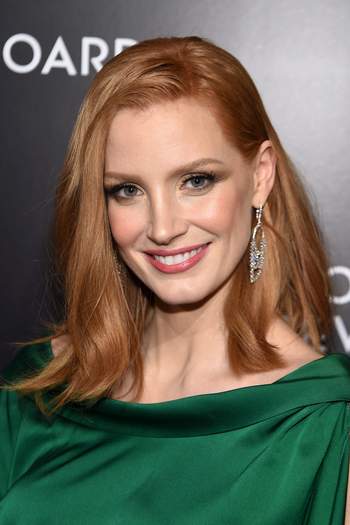The Guardian
Sophie Heawood
 Jessica Chastain is such an extraordinary actor that you almost miss her. She brings so little ego to the roles she plays, so little of herself, that you go away with no idea who that actress actually was. Some Hollywood stars seem adept at pulling a film’s centre of gravity towards them; Chastain seems to exist in a quiet gravity of her own.
Jessica Chastain is such an extraordinary actor that you almost miss her. She brings so little ego to the roles she plays, so little of herself, that you go away with no idea who that actress actually was. Some Hollywood stars seem adept at pulling a film’s centre of gravity towards them; Chastain seems to exist in a quiet gravity of her own.
In The Help, which gave her an Academy Award nomination for best supporting actress (and won her a Bafta and Golden Globe award), she played Celia Foote, a brassy, busty blonde. Given that the script traded on stereotypes, you can imagine another actress making more of a meal of it. But Chastain’s Celia, even when drunk and out of control, had a quietness that was devastating.
Her second Oscar nomination was for Zero Dark Thirty, directed by Kathryn Bigelow, in which she played Maya, the CIA operative who tracks down Osama bin Laden in Pakistan. When watching President Obama on the news, saying that America does not torture, her expression remains inscrutable, even though we know she has been party to such torture. “That vacant face partly explains, I suspect, why Zero Dark Thirty has stirred up so much controversy,” wrote Manohla Dargis, admiringly, in the New York Times.
All of which leaves me wondering whom I am actually going to meet, when I arrive at Universal Studios in Los Angeles to interview her. We are introduced in a trailer (not hers: it’s fairly impersonal). She is charming, immaculately groomed in a smart short dress, sitting with a poise that feels almost old Hollywood. Except that she then admits she’s freezing in her smart short dress and can someone fetch her coat to put across her knees. She is friendly but not gushing; she doesn’t pretend we are going to be best friends. You realise she has become a movie star because she has spent her whole life preparing to be a movie star.
Within minutes, though, the stuff Chastain is talking about is so new Hollywood as to be almost radical. When we meet, a lawsuit filed by the pop star Kesha, who wants to get out of her Sony contract because, she alleges, her producer Dr Luke has repeatedly raped and abused her, is all over the news; Adele has just announced her support, while Taylor Swift has offered to pay some of her legal fees. Dr Luke has denied all of Kesha’s allegations. Meanwhile, the fight for equal pay in Hollywood is hotting up, too, and Chastain is massively encouraged by all of this.
“Now, it’s like” – she does an angry voice through gritted teeth – “We are so tired of this.” She mentions the 2007 documentary Girl 27, about the rape of a Hollywood actress in 1937, condoned by the actress’s own studio. “Because that was how they did it back then. So you think now, it’s a really brave thing to come forward and say something is not OK. And to see the support of other famous women coming out. How great is it, when there’s no fear? This myth that women don’t get along well – who does that serve? It doesn’t serve women.”
She stops short of saying that it serves the patriarchy, but her meaning is clear.
“I remember reading this article that talked about the ‘fight’ between me and Jennifer Lawrence, how we were rivals because we were up for the same Oscar [for Zero Dark Thirty and Silver Linings Playbook, respectively]. They never say that when men are nominated in a category. So I went on my Facebook and said it wasn’t true, because I thought, I’m not standing for this any more; because that being out there tells women that other women are not supportive. In fact, if you see a movie like Brooklyn, with Saoirse Ronan, and what a great job she did – the more incredible performances there are out there, the more parts for women there are going to be, because audiences are going to want to see it. So why would it benefit anyone to deny accolades for others? It’s this long fairytale that women don’t get along. But we’re changing that.”
I say, less optimistically, that Kesha was still denied a preliminary injunction that would have allowed her to record outside the terms of the contract, so has anything changed? “I agree with what you’re saying,” Chastain replies, while not really agreeing, “but public opinion matters more than this court case. It’s a tipping point. And that will change what Sony decides to do. I feel really positive about where we are right now. Last year at the Oscars, I was so disappointed – all the best picture nominees, not one of them had a female protagonist. I was so tired. And the women nominated for best actress were really in a supporting role, because there weren’t enough movies with best actress roles made that year to nominate.” Her face is dumbfounded, though she then brightens about the 2016 awards, pointing out that four out of the seven films nominated had a leading actress.
Everybody was white this year, though; in other ways, it was the least diverse Oscars in some time. “I know,” she says quietly. “It’s a big machine. Baby steps.”
I tell her that, on a lighter note, journalist Caitlin Moran says we’ll only know gender equality has reached Hollywood when women wear comfortable shoes to awards ceremonies. “The problem with that,” Chastain replies, “is that I’m five four. I don’t know if there will ever be a day that I’m not wearing heels. I’m a very big personality and I don’t like to look up at other people.” She laughs, then admits what a pain the red carpet actually is. “I love fashion, but it’s like a whole other industry. You have to lie down in the car because you don’t want to wrinkle the dress, so you’re in an SUV – we don’t actually take limos – and you’ve got to put the seat all the way back, but then you can’t mess up your hair, and if you’re wearing a backless dress, it’s going to give you those weird lines on your back. So, actually, we’re all arriving like this.” She does a sort of yoga boat position where she leans back and sticks all her limbs straight out in front, with only her bum on the seat, sort of levitating.
“Then I forget to stand up straight on the red carpet, and every time I slouch… How many times does my publicist get those messages? ‘Oh, yeah, they’re wondering if you’re pregnant?’ No. I just stood like a normal person,” says Chastain, who is in a relationship with Gian Luca Passi de Preposulo, an Italian aristocrat.
Over a year ago, the Sony Pictures email hack revealed, among many other things, that Jennifer Lawrence and Amy Adams had been paid less than their male co-stars on American Hustle. Amy Pascal, director of the company, was asked about it afterwards; Chastain was paying close attention. “She said, the reason they get paid less is that they don’t demand more. In the beginning of your career, you’re scared to death to speak out, because you’re just so grateful to be working. Amy Pascal said actresses need to stop being grateful. So I’m testing that out! I think people know, if they’re going to hire me I’m not going to just be grateful. There have been situations where I have lost movies because I’ve said, this is not a fair deal, and I’ve walked away.” Lest it seem that the pay gap is not that significant, Chastain explains: “I heard a story… oh, I can’t believe I’m gonna tell you this.” But she does. “This woman, she’s very famous, she’s been nominated for many, many Oscars. For one film, the man got paid $4m and she got $250,000.” Obviously, I am desperate to know who this is, but she won’t be drawn. That difference equates to 1/16th of the pay cheque, which happens to be the rough proportion Chastain says she got paid for The Martian, compared with co-star Matt Damon’s $25m (admittedly, she had a much smaller role).



